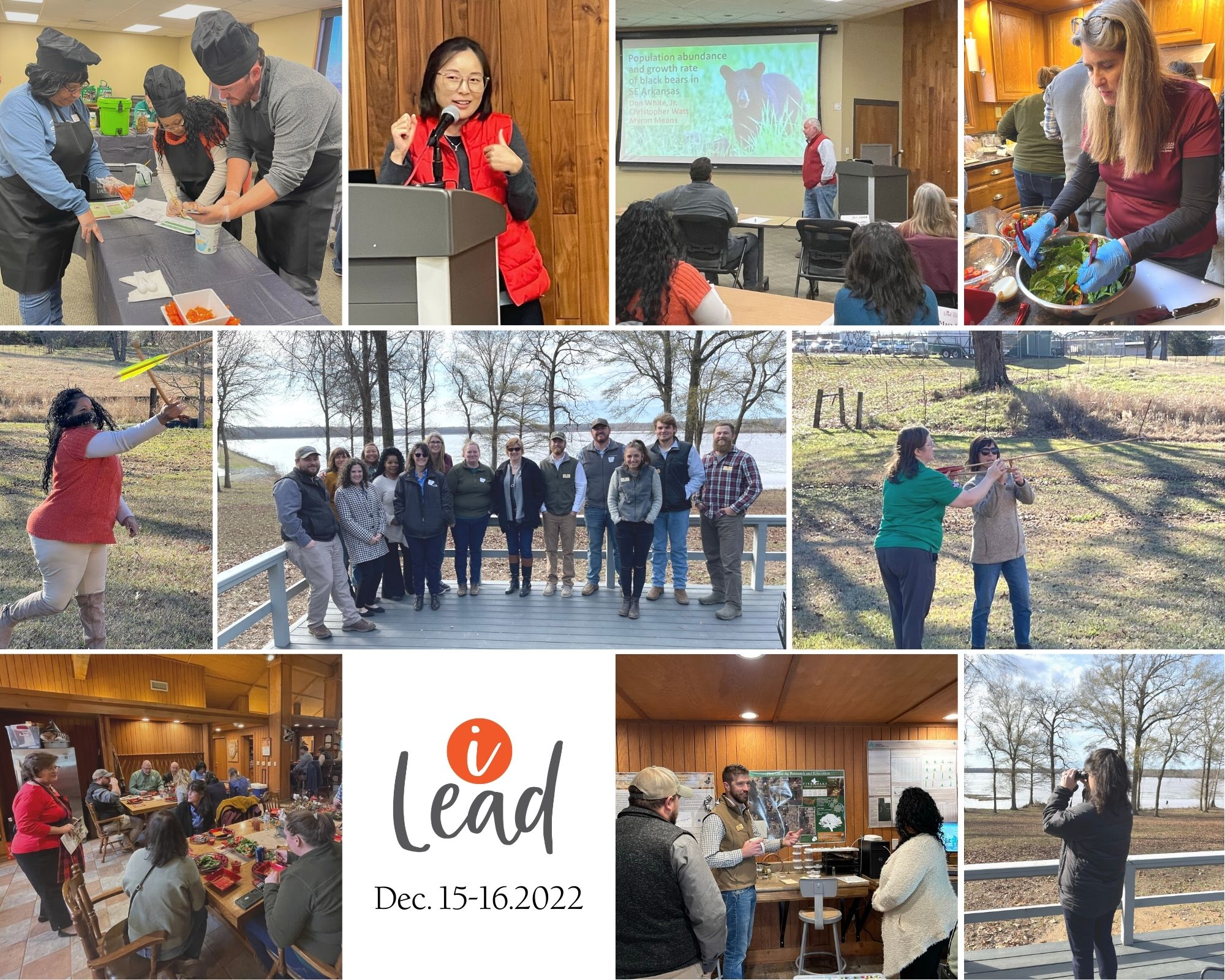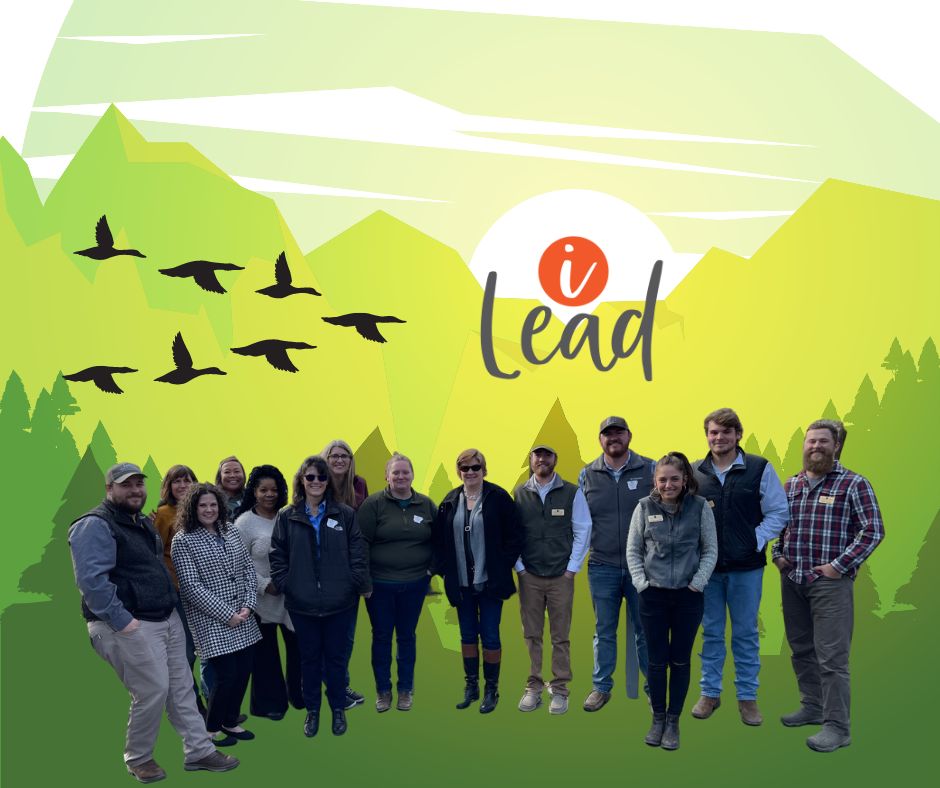Posts
Contact
Lisa Davis
Program Associate-Leadership
Phone: 501-519-5472
Email: ldavis@uada.edu
University of Arkansas System Division of Agriculture
Cooperative Extension Service
2301 S. University Avenue
Little Rock, AR 72204
Forestry, environmental education and cooking, oh my!
 Our fifth session of the iLEAD program was based at the University of Arkansas at
Monticello (UAM). This session was packed with interesting speakers that covered topics
in forestry and natural resources, animal science, plant pathology, crop economics,
and environmental education. Forestry and natural resources interest dominate the
landscape and it was super interesting to learn about the work that is happening at
UAM and the University of Arkansas System Division of Agriculture (UADA) in the southeast
region of Arkansas.
Our fifth session of the iLEAD program was based at the University of Arkansas at
Monticello (UAM). This session was packed with interesting speakers that covered topics
in forestry and natural resources, animal science, plant pathology, crop economics,
and environmental education. Forestry and natural resources interest dominate the
landscape and it was super interesting to learn about the work that is happening at
UAM and the University of Arkansas System Division of Agriculture (UADA) in the southeast
region of Arkansas.
Dr. Michael Blazer started things off by sharing information about students and campus life in the College of Forestry, Agriculture, and Natural Resources and some of the work taking place in the Arkansas Forest Resource Center. We walked around campus and toured the Agriculture building which also houses some Cooperative Extension Service (CES) offices and UADA labs as well as the College of Ag faculty and classrooms.
We had additional speakers throughout our session talking about different opportunities and challenges in the forestry industry and where UAM has been successful. You could feel the passion each person had for their work.
We heard from Matthew Pelkki and others from the UAM Center for Arkansas Forest Business who share information about this new center and forestry trends and challenges in Arkansas like the overproduction of biomass. UAM, led by Nana Tian, just recently (December 2022) received a $3.7M USDA Climate Smart Agriculture grant on restoring hardwood forests in the Arkansas bottoms lands.
We also heard from soil scientist, Katy Bridges, who is on the project and she talked about soil health, soil carbon and soils being a source and a sink for carbon.
Rounding out our natural resource discussion for day one, we heard from Don White who talked to us about his work quantifying the black bear population and growth rate. It was super interesting to hear about the history of the decline of black bears in Arkansas, their re-establishment and apparent successful restoration.
We also heard from several people working in the animal and crop sciences fields on day one. Dr. Maribel Nelson teaches animal science and took a break from her morning artificially inseminating ("AI-ing") cows to share with us some of the challenges in veterinary medicine both in Arkansas and nationally. These challenges include but are not limited to the high cost of education with low expected pay, extensive educational requirements, and mental health/burnout of veterinarians.
Dr. Terry Spurlock runs his plant pathology lab on the UAM campus but is a UADA employee. He works on mostly fungal diseases in agronomic crops and employs many students from campus. He also works with AI but in an ‘artificial intelligence’ perspective! I appreciated Dr. Spurlock insights on managing his lab. He values people over end results and he tries to foster a supportive ‘people focused’ environment in his lab. He made a great point that when people feel valued, they do good work. This approach has allowed him to be successful in his work, working remotely and across 25 sites for many years.
We had several experiential learning activities and cooking challenges in this session!
Amanda Welch led us in a version of the 4-H Food Challenge, an program and event she leads each year. We were put into two teams and had to come up with a recipe, prepare it, present it along with budget and nutritional data in a limited time frame. This was a fun and creative challenge that offered team-building with a sprinkling of light-hearted competition.
We continued our experiential learning with Hope Braggs, environmental educator for CES 4-H. We tried our hand at playing prehistoric shoot sports throwing a long arrow using an atl-atl. We did some other learning activities with Hope on day two that focus on water – how water flows through our environment and the percentage of water on earth and then how to build a fire from scratch.
Participating in these activities drives home the importance of experiential learning activities. At Center for Arkansas Farms and Food (CAFF), ‘doing while learning’ is incorporated into our foundational programs, the Farm School and the Farm Apprenticeship program, however we still have outreach programs that don’t employ much hands-on learning. Putting me in the learner’s shoes rather than the educator shoes, as with our CAFF programs, made me recognize the value of this approach even more but also our need to incorporate additional opportunities for hands-on learning where this is lacking.
Our second day of seminar took place at Five Oaks Agriculture Research Extension Center. Dr. Ryan Askren shared information about the center, ongoing research, and its graduate certificate programs where they house interns. We also toured the facility and met with the graduate interns.
And then we made lunch! Leigh Ann Bullington and Keith Cleek broke us into teams and we worked together to make a soup, salad, dessert and drinks. No competition was involved with this one – except maybe with the stove! It was fun and satisfying to work together to prepare a meal and then eat with many of the people joining us from the two-day event.
To wrap up the event we shared information among our iLEAD group our project ideas, got some feedback and said our good-byes! On our drive home, which is always part of the fun, we decided that 4-H has the best swag! We came home with a 4-H lunchbox, water bottle and trowel. Thank you!
